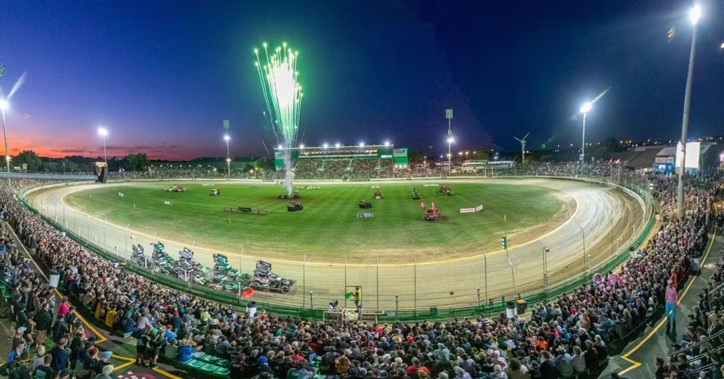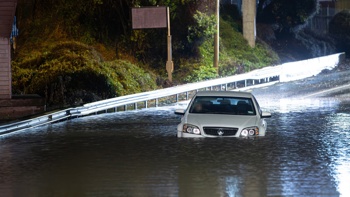
* Palmerston North City Council has proposed to extend its sugary drinks ban to include a beloved sports ground and other venues.
* One submission told the council it’s not the city residents’ “mother” while a sports promoter said the proposal is a step towards “Big Brother controlling everything”.
* Council and health officials say fewer sugary drinks – with other measures – will “promote healthier lifestyle choices” for locals and visitors.
The days of washing down a hotdog with a fizzy drink – and some other sugary drinks – while watching sport at a prominent Kiwi stadium could soon be a thing of the past.
In a move that has split submitters, the Palmerston North City Council (PNCC) has proposed formally extending its ban on the selling sugar-sweetened drinks, which include some fizzy drinks, to eight more of its venues.
That includes Central Energy Trust Arena, home to the Manawatū Turbos NPC rugby team, which is an international-quality speedway track that will host 30,000 fans at next weekend’s two-night National Superstock Teams Championship and was also a match venue at both the 1987 and 2011 Rugby World Cup tournaments.

Up to 30,000 fans will attend next weekend's National Superstocks Team Championship at Central Energy Trust Arena.
The venue has also hosted Super Rugby and A-League matches, the British and Irish Lions, and Wellington Phoenix A-League football action; while an indoor arena on-site is home to the Manawatū Jets NBL basketball team, as well as previously hosting Silver Ferns clashes, Davis Cup international tennis and a Joseph Parker professional boxing bout.
The PNCC says the aim of the draft Health Promotion Policy 2024 – which could be introduced as early as March – was to “promote healthier lifestyle choices for Palmerston North residents and visitors”.
But the plan has been slated in some submissions from ratepayers, while local speedway promoter Bruce Robertson questioned whether it was a council’s role to limit sports punter’s non-alcoholic drink choices.
“It really is people’s decision as to what they want to drink,” Robertson told the Herald.
“In my mind, it is Big Brother controlling everything.

Palmerston North's Central Energy Trust Arena is home to the Manawatu Turbos rugby team in the NPC. Photo / Photosport
“I feel people should be able to make their decisions as to what they want to drink, make their own mind up about it. Put the information out there, but let the people decide.”
The proposal said while some popular fizzy drinks would be banned, free and clean drinking water would be made available. PNCC had previously started phasing out some sugary drinks at the Central Trust Energy Arena.
The health promotion policy would combine three PNCC health-related policies – healthy beverages, smoke-free and vape-free, and sun protection – into one.
A decision to make the policy as it is worded binding could come as early as March.
In 2005, the British and Irish Lions played at Central Energy Trust Arena, with their fans packing out the stadium. Photo / Brett Phibbs
As well as covering fizzy drinks, the potential clampdown on the sale of sugary drinks would also target other carbonated soft drinks, fruit drinks and flavoured milk.
The proposed policy would also require smoke-free and vape-free signs to be in both te reo Māori and English and require sunblock stations to be available at “council-delivered” community events between September and April.
Those events include the city’s official New Year celebrations.
In a statement to the Herald, the PNCC said that while the staff at the arena had received “some negative feedback” about the scaling back of drink offerings that already existed, the proposed policy was an important one aimed at improving the health of locals and others attending events.
“As noted in the council report, children in the Midcentral region have poor oral health (ie decayed, missing, and filled teeth) compared with those in other regions,” the council statement said.
“One of our council objectives is to support and promote community health. The provisions of this proposed policy would not prevent people from buying or consuming fizzy drinks, but rather restrict some of their opportunities to do so.”
The availability and impacts of sugary drinks has become increasingly debated over the past decade in New Zealand.
Health officials say adults should ideally consume no more than six teaspoons of sugar a day, and children no more than three or four.
Action at Central Energy Trust Arena during an A-League clash between the Wellington Phoenix and Perth Glory in 2023. Photo / Photosport
A 355ml can of fizzy drink can contain up to nine teaspoons of sugar.
Te Tai Ora Public Health – a division of the National Public Health Service – says consuming sugary drinks increases the risk of obesity, diabetes and tooth decay.
It says children who consume one or more sugary drinks daily are 50%-60% more likely to be overweight or obese than children who don’t.
“Having one or two sugary drinks per day may increase the risk of developing type 2 diabetes by 26%,” it adds. “The high sugar content and acidity of many sugary drinks can cause tooth decay.”
Health bosses: “Providing access to drinking water is an effective way to promote water as the best choice of drink”
In 2016, 74 health professionals wrote an open letter to the then-Government to introduce a 20% tax on sugary drinks. The letter estimated such a tax would generate between $30m-$40m which could fund obesity prevention programmes.
Before losing the 2023 election, the Labour Party also investigated banning sugary drinks in schools in a bid to combat obesity and poor dental health.
In December, written and oral submissions were presented at a PNCC meeting from 56 individuals and organisations; the latter including Health New Zealand Te Whatu Ora (HNZ), Cancer Society Manawatū (CSM) and Age-Friendly Palmerston North (AFPN).
Opponents said the stance on sugary drinks was a case of council overreach; one person wrote PNCC should “butt out”, while others questioned why the council was spending money on such a policy during the current tough financial climate.

Under the Palmerston North City Council's proposal, a range of fizzy drinks and other sugar drinks would be banned at a leading Kiwi sports stadium. Photo / File
“I find it bizarre that I can go to an event at a council facility and load up on alcohol or candy floss but I can’t have a soft drink with sugar in it. Where is the logic?” one submission states.
Another opponent wrote: “I don’t agree that it aligns with the Palmy vision of having small city benefits with big city ambition. This policy is attempting to make Palmy a ‘nanny state’ institution by taking away people’s right to the freedom of choice.”
That submitter added: “Stop this petty control. PNCC does not own or need to mother its inhabitants.”
The most detailed written submissions were from those backing the proposed plan.
A submission from HNZ’s MidCentral district said it “commends” the proposal covering beverages, protection from the sun, and smoke-free and vape-free environments.

The Silver Ferns line up ahead of an international at the indoor stadium at Central Energy Trust Arena. Photo / Photosport
“Council is well-positioned to determine the management of public spaces and events, playing a crucial role in fostering environments that support and promote healthy communities.”
It added specifically on the issue of drinks: “HNZ supports extending the list of council facilities where sugar-sweetened beverages cannot be sold.
“Providing access to drinking water is an effective way to promote water as the best choice of drink. It is especially important for children and young people to see adults modelling healthy drinking habits.”
AFPN wrote it supported the proposal that would “create and promote supportive environments to build healthy communities”.
“The harms to our communities caused by smoking and vaping, unhealthy sugar-sweetened beverages and over-exposure to UVR are all modifiable risk factors in the development of cancers, heart disease stroke, respiratory disease and declining oral health.”

Super Rugby under lights at Central Energy Trust Arena. Photo / Photosport
The PNCC statement said it would respond to all the submissions when a deliberations report was presented to its community committee on March 19.
“The committee will deliberate and make a recommendation to council regarding the adoption (or otherwise) of a final policy.”
Neil Reid is a Napier-based senior reporter who covers general news, features and sport. He joined the Herald in 2014 and has 33 years of newsroom experience.
Take your Radio, Podcasts and Music with you









